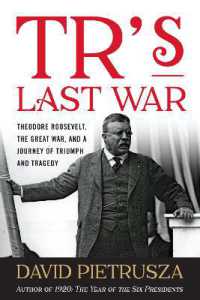- ホーム
- > 洋書
- > ドイツ書
- > Humanities, Arts & Music
- > Religion & Theology
- > christianity
Full Description
Recent years have seen a paradigm shift in Christian self-understanding. In place of the eurocentric model of "Christendom", a new understanding is emerging of Christianity as a world movement with considerable cultural variety. Concomitant with this changing self-perception, a new theological discipline begins to take shape which analyzes the inter- and transcultural character and performance of global Christianity: Intercultural Theology. Judith Gruber discusses this nascent theological approach in two parts. She first gives a critical analysis of its historical development in the first part of the book, two theological sub-disciplines of particular relevance are analysed: (1) missiology and its reflection on the encounter of Western Christianity with other cultures in the context of colonialism; (2) contextual theologies which focus on the particularity and dignity of the diverse cultural contexts of theological practice, but fail to sufficiently integrate the universal dimension of Christianity into their theological reflections. Secondly, this study offers a constructive theological approach to intercultural theology. It does that by bringing systematic theology into conversation with cultural studies. This interdisciplinary approach adds significant complexity to existing reflections on Intercultural Theology: Re-reading the theological history of Christianity within the critical framework of cultural theories exposes a host of disparate and conflictive Christianities underneath its dominant master narrative, and, moreover, it no longer allows a recourse to essentialist concepts of Christian identity, with which previous approaches to Intercultural Theology have mitigated this unsettling cultural plurality of Christianity: After the "Cultural Turn", which has made a metaphysical epistemology untenable, new ways for thinking the unity and universality of Christianity have to be paved. The book draws on Paul Ricoeur's and Michel Foucault's concept of the event and on Michel deCerteau's proposal of a "Weak Christianity" in order to develop such a post-metaphysical framework, which allows to conceive of the unity and universality of Christianity without concealing its cultural plurality and contingency.




